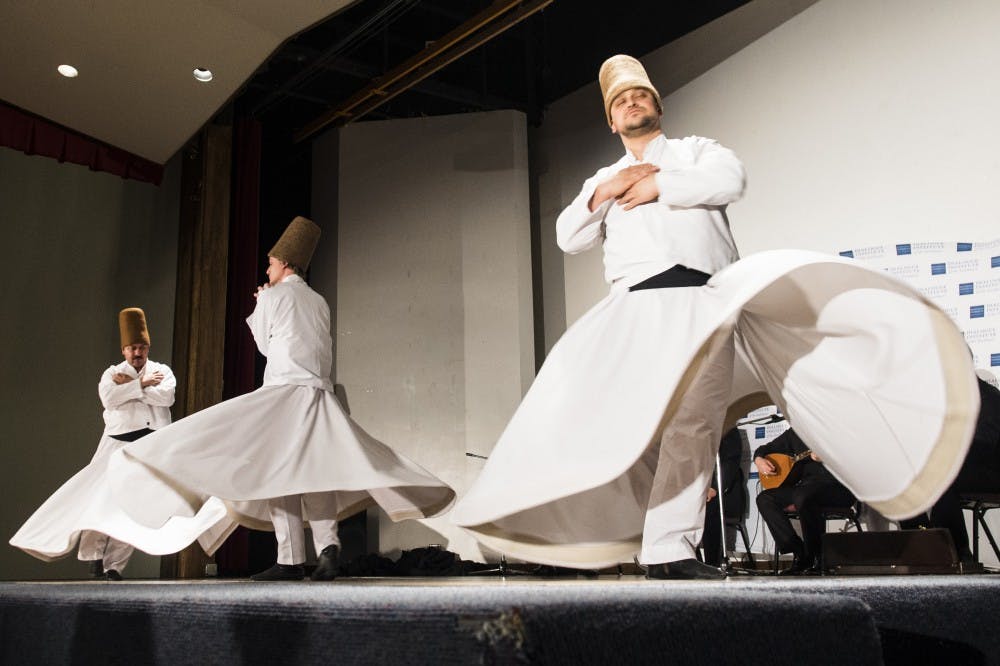The Sema Ritual, a seven-century-old tradition inspired by the poetry of Mevlana Jalaluddin Rumi, is an essential part of the Sufi branch of Islam.
Gazi Ergisi, singer for the Sufi musical ensemble of the event, said the ritual is composed of the combination of musical elements with the stylistic, whirling dance of the Dervishes — the Sufi dancers.
“The meaning of the tradition is taking from God and giving to the people through tradition, that is why the Dervishes have one hand facing up and the other facing down as they whirl,” Ergisi said.
One of the most common oral traditions of the Sufi tells of a meal served to Dervish apprentices who were given 5-foot-long spoons, he said. Only two of the apprentices find a way to eat, each one using the spoons to feed the other across the table instead of feeding themselves individually.
“The idea is to live for someone else, not for yourself,” Ergisi said. “Live for your daughter, wife, father, mother and live for your friends. Being Dervish is not just turning — it involves a philosophy of life.”
Being able to perform this ritual in Albuquerque implies much more than sharing a cultural item; it is an opportunity to rid people of misconceptions about Muslim communities across the world, he said.
Some negative generalizations about Muslims compromise the other diverse identities across the globe which is in no way associated with the inhumane activities of terrorists, Ergisi said.
“If you really know someone then you are not afraid of them. By showing these cultural aspects of us, we are introducing the Muslim culture in a better light” he said.
Albuquerque’s first Poet Laureate, Hakim Bellamy, said people should be critical when watching news. A skewed and filtered bias is created about the Muslim world without the news media really knowing how people live and love in other countries, he said.
The Raindrop Foundation strives to open an educational dialogue through events like The Whirling Dervishes in an effort to curtail misconceptions and narrow-minded stereotypes, Bellamy said.
At the event, Bellamy recited two of Rumi’s poems, which inspire love and the idea that people are not separate beings but rather all one, he said.
Get content from The Daily Lobo delivered to your inbox
“People are still reading his words because there is still a place for that. People are still hungry for this idea that we can do better and that we can treat each other better,” he said.
Rumi’s philosophies on life have been around for almost 800 years and are inextricably intertwined with the poems, making the messages accessible and attractive for people from all walks of life, he said.
George Sieg, an adjunct professor at UNM West, said he was impressed by this exchange of cultures where people were given the opportunity to expand their awareness of global diversity.
“I am often amazed and impressed by the opportunity to be exposed to this kind of material here in Albuquerque,” Sieg said. “I was very struck by the element of Sufi mysticism being expressed through the Turkish music and the style of the performance.”
The serenity of the Dervishes entranced him, since it was very apparent that through the dance they were engaged with their spiritual experience, he said.
Ash Hatcher, who attended the event, said the synchronization of the dance and music was enticing.
“I would definitely come see it again, and I would definitely bring more people to see it,” she said. “The speakers were awesome.”
Mateo Rocha is a freelance reporter for the Daily Lobo. He can be reached at culture@dailylobo.com, or on Twitter @DailyLobo.






